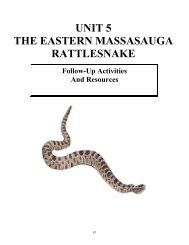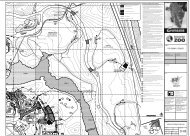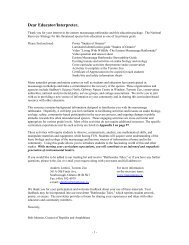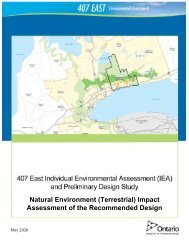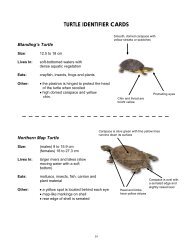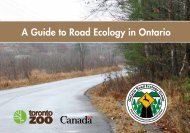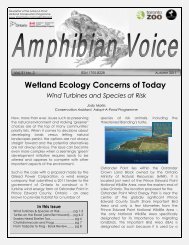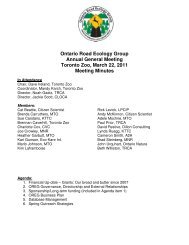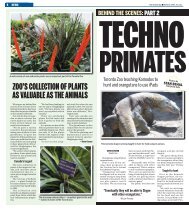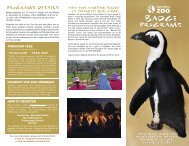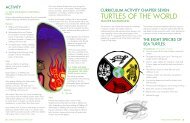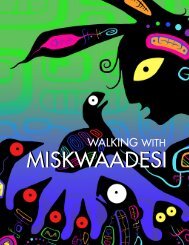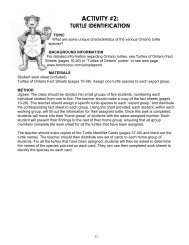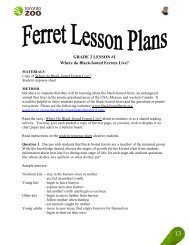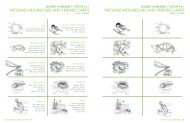MISKWAADESI - Toronto Zoo
MISKWAADESI - Toronto Zoo
MISKWAADESI - Toronto Zoo
You also want an ePaper? Increase the reach of your titles
YUMPU automatically turns print PDFs into web optimized ePapers that Google loves.
Turtle island<br />
conservation Partnership<br />
Walking with<br />
Miskwaadesi<br />
Curriculum Written by<br />
Wahgeh Giizhigo Migizi Kwe
Turtle island<br />
conservation Partnership<br />
Walking with<br />
Miskwaadesi<br />
Curriculum Written by<br />
Wahgeh Giizhigo Migizi Kwe
Acknowledgements<br />
The <strong>Toronto</strong> <strong>Zoo</strong>’s Turtle Island Conservation programme respectfully acknowledges the wisdom and guidance of all First<br />
Nation Elders and Traditional Knowledge Keepers. The sacred turtle teachings this curriculum is based upon have existed<br />
since the beginning of time and are shared to foster and guide generations to come. It is with good hearts and minds<br />
we honour these original teachings so that each one of us walks that good red road our ancestors had planned for us.<br />
We respectfully acknowledge with infinite gratitude all First Nation Elders, First Nation community members, Traditional<br />
Knowledge Keepers, First Nation advisory group members, funding partners, First Nation authors, Benny Michaud,<br />
Candace Maracle, Barbara Filion (previous programme coordinators) & summer students, <strong>Toronto</strong> <strong>Zoo</strong> staff and the many<br />
children & youth who continue to inspire us for generations to come! We apologize for any oversights.<br />
We would like to say Chi Miigwetch (thank-you)<br />
Wahgeh Giizhigo Migizi Kwe (Eileen “Sam” Conroy)<br />
for your tireless dedication, passion and great love all of<br />
which made this project possible. We honoured by your<br />
contribution! With your wealth of life experience and<br />
commitment to those who have come before us, you have<br />
gifted us all with Elder wisdom, carefully planting seeds of<br />
knowledge for future generations!<br />
Funding for the Walking with Miskwaadesi curriculum<br />
project has been generously provided by:<br />
Aboriginal Funds for Species at Risk (AFSAR)<br />
Habitat Stewardship Program (HSP)<br />
Museum Assistance Program (MAP)<br />
<strong>Toronto</strong> <strong>Zoo</strong><br />
Young Canada Works (YCW)<br />
Original drawings, illustrations and photographs provided by:<br />
Wahgeh Giizhigo Migizi Kwe (Eileen “Sam” Conroy)<br />
Design de Plume<br />
Bernice Gordon<br />
Josephine Mandamin<br />
Children of Wasauksing Kinoomaugewgamik<br />
Mary Kate Whibbs<br />
We send special thanks to the team of Design de Plume.<br />
Your brilliance, dedication and high standards have infused<br />
beauty and originality into this labour of love.<br />
Writing and editing contributions by:<br />
Wahgeh Giizhigo Migizi Kwe (Eileen “Sam” Conroy)<br />
Grafton Antone & Dr. Eileen M. Antone (Introduction to<br />
Iroquoian Oneida Language 2008)<br />
Bob Johnson<br />
Stewart King Wasauksing Traditional Knowledge Keeper<br />
Skye Vandenberg<br />
Kim Wheatley<br />
Available online at:<br />
http://www.torontozoo.com/pdfs/Stewardship_Guide.pdf<br />
Any reproduction of this document in whole or in part<br />
requires acknowledgement and written permission by the<br />
<strong>Toronto</strong> <strong>Zoo</strong> Ways of Knowing Partnership Turtle Island<br />
Conservation programme.<br />
Citation for this document:<br />
E. Conroy, K. Wheatley, B. Johnson, 2010<br />
Walking with Miskwaadesi, <strong>Toronto</strong> <strong>Zoo</strong>
As the journey begins<br />
The Ways of Knowing Guide and the Walking with Miskwaadesi Curriculum have been<br />
compiled and written to complement each other, and so we are invited to begin our journey<br />
in learning by reading the Ways of Knowing Guide, and to revisit it in smaller sections while<br />
we are Walking with Miskwaadesi, exploring the 13 challenges that she gives us. Reflecting<br />
upon the worldview, values, beliefs and stories that are shared within the Guide will assist<br />
us in developing an awareness of Anishinaabe and Haudenosaunee Traditional Knowledge<br />
Worldview that is necessary if we are to successfully respond to the challenges and if<br />
we are to truly understand the interconnectedness of life on Turtle Island and our role and<br />
responsibilities within this beautiful web of life.<br />
We are asked to walk along a pathway, in the footsteps of Miskwaadesi, the Turtle and to<br />
learn about the environmental issues that confront the plant and animal members (in particular<br />
those who have been designated as Species-At-Rrisk) of the water world. The invitation to<br />
share in the journey is given to us both as educators and as learners and we are reminded<br />
that we will be learning, along with our students, from the land, the water, and the other<br />
members of creation throughout the journey.<br />
4
As we begin our journey with Miskwaadesi we become increasingly<br />
aware that those paw prints, marks and steps that we see are not just<br />
turtle tracks - the pathway we follow contains the imprint of all plants<br />
and animals that share the environment with the turtle. We reflect that as<br />
our footsteps make imprints on the pathway they mingle with all those<br />
other prints and we come to understand that we have an impact on all<br />
other members of creation just as they have an impact upon us. We are<br />
reminded to be respectful of all members of creation and to honour them,<br />
and so we walk in a gentle and careful manner, sharing our space on the<br />
pathway, being mindful of the need to make room for the footsteps of the<br />
next seven generations to follow.<br />
THE<br />
WAYS OF<br />
KNOWING<br />
GUIDE<br />
Turtle island<br />
conservation Partnership<br />
Walking with<br />
Miskwaadesi<br />
Curriculum Written by Sam Conroy<br />
When we walk beside Miskwaadesi, we begin to understand our<br />
relationship to her and to those other life forces that are part of the<br />
pathway. Our footsteps become interwoven with those other prints and<br />
marks and we start to see, hear, breathe, and feel our interdependence<br />
as we move along on our journey. Our pathway takes us outdoors, to the<br />
land and the water where the teachings are given, and where we can be<br />
closer to all of those teachers in nature - the plants, animals, and elements.<br />
As we walk this pathway with Miskwaadesi in one hand we carry with us<br />
the Ways of Knowing Guide, stopping along the way to re-read sections<br />
that pertain to each of the 13 challenges. In our other hand we carry the<br />
Walking With Miskwaadesi challenges. The Ways of Knowing Guide<br />
shows us where the pathway has come from as it helps us to keep our<br />
focus and attention while we engage in the learning of each challenge,<br />
respecting the footsteps of other life forms who walk with us. The Walking<br />
with Miskwaadesi challenges provide us with opportunities to practice<br />
and to demonstrate our learning as we become actively involved in<br />
making an environmental difference today. Combining the two documents<br />
together enables us to follow the pathway, picking up teachings and<br />
new understandings. Grounding ourselves in the worldview, traditions,<br />
beliefs and stories of the Anishinaabe and Haudenosaunee Nation will<br />
give us the background we need to deal with the issues of today and<br />
our individual and group actions will make a positive difference to our<br />
environment, providing sustainable solutions that will be carried forward<br />
to the next seven generations… and the old turtle will smile upon us as we<br />
honour the Dish with One Spoon agreement to share the land, the water,<br />
and the resources in a good way!<br />
5
“Challenges are met with<br />
great honor especially when<br />
we know it is for a deep<br />
purpose - the betterment of all,<br />
especially our Mother Earth.<br />
We are guided by vision<br />
and dreams, but most of all<br />
we are guided by our<br />
Spirit and Spirit Helpers.“<br />
Josephine Mandamin’s Journal - Mother Earth Water Walkers
Table of contents<br />
walking with miskwaadesi<br />
Sacred Spaces- Special Places – Mapping our Community pg 12<br />
Making a Simple Map of my class and my room<br />
Where are the special places in my community?<br />
How will we identify them?<br />
Sharing our sacred spaces with the Elders<br />
Ways of Knowing Guide – Responsibility – Community Mapping – pg 94<br />
1 st CHALLENGE – 13 MOONS ON A TURTLE’S BACK PG 22<br />
Introduction to challenges. 13 moons community calendar<br />
Walk in the turtle’s footsteps<br />
Ways of Knowing Guide – Relationship – the Sky World – pg 75<br />
2 nd CHALLENGE – CREATION STORIES PG 56<br />
Being grateful and thankful for our gifts.<br />
Turtle Responsibilities and turtle clan responsibilities; interview<br />
Ways of Knowing Guide – Respect – pg 15<br />
3 rd CHALLENGE – THE BASICS PG 72<br />
Turtle Species in Ontario; Species at Risk; card games; outdoor games<br />
Ways of Knowing Guide – Relationship – pg 46<br />
4 rth CHALLENGE – TURTLE NEEDS PG 111<br />
Habitat needs of turtles in Ontario; card games; outdoor games<br />
Ways of Knowing Guide – Reciprocity – pg 53<br />
5 th CHALLENGE – NEIGHBOURS AND FRIENDS PG 129<br />
Food webs and food chains in a wetland; other species who<br />
Share habitat with the turtle and how they depend upon each other<br />
Making a web-of-life on a dream catcher frame<br />
Ways of Knowing Guide – Relationship – Interdependent Relations – pg 46<br />
6 th CHALLENGE – TURTLE STORIES AND TEACHINGS PG 166<br />
Storytelling and turtle teachings to share<br />
Researching stories and legends about turtles<br />
Ways of Knowing Guide – Relationship – pg 46<br />
7 th CHALLENGE – TURTLES EVERYWHERE PG 187<br />
Sea turtles at risk – using the computer to learn about turtles<br />
Participating in on-line games and searches – web-quests<br />
Ways of Knowing Guide – Reciprocity – pg 53<br />
8 th CHALLENGE – WATER Walking PG 211<br />
Walking around your watershed for the water and for the turtle;<br />
Meet an Anishinaabe Kwe Elder who has walked around the Great Lakes<br />
Ways of Knowing Guide – Relationship – the Waters – pg 78
9 th CHALLENGE – HOW MUCH WATER PG 230<br />
Personal water audit – learning to conserve water for the benefit of all<br />
Your personal watermark; making a commitment string<br />
Ways of Knowing Guide – Relationship – the Waters – pg 78<br />
10 th CHALLENGE – FROG FRIENDS AND MORE PG 259<br />
Focus on frogs in the wetland – the early wakers in the wet world;<br />
Participating in the Frogwatch project; learning to listen; pond study<br />
Ways of Knowing Guide – Relationship – The Waters – pg 78<br />
11 th CHALLENGE – TALLY UP FOR TURTLES! PG 282<br />
Participating in the turtle tally<br />
Protecting turtles in your local community – signs; nest sites<br />
Ways of Knowing Guide – Reciprocity – Indigenous Ways of Knowing – pg 53<br />
12 th CHALLENGE – GET ACTIVE FOR TURTLES PG 299<br />
Individual ways of helping the turtle through an action project<br />
Awareness leads to a Responsibility to become Active;<br />
Ways of Knowing Guide – Relationship – Interdependent Relations pg – 46<br />
Ways of Knowing Guide – Responsibility – Community Mapping – pg 94<br />
13 th CHALLENGE – FEASTING THE TURTLE PG 310<br />
Prepare and host a feast for the turtle; cooking traditional foods;<br />
Saying “Miigwetch”<br />
Ways of Knowing Guide – Responsibility – Seven Generations Teaching – pg 98<br />
8



